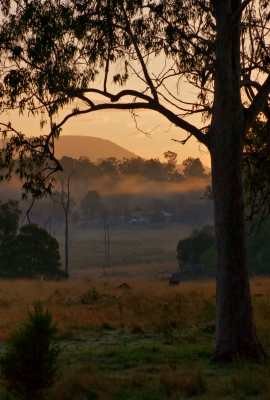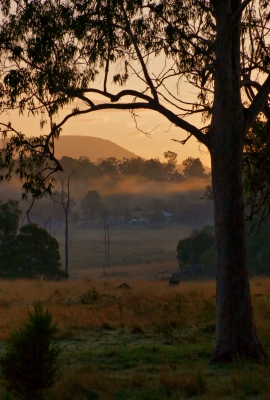This is a re-post from several months ago. The long-ago memory is still bittersweet…
It wasn’t anything especially fancy–a simple, two-story, native-stone home, bedecked by majestic scotch pines. Stone pillars stood at each corner of the property, as if guarding the inanimate, century-old gem.
As the auctioneer took his place on the flatbed trailer, he nodded toward a silver-haired gentleman who, I assumed, was the owner.
“Okay, Jeb. We’re gonna do this thing.”
And so the auction began. With the familiar cadence of auctioneer-speak, I listened, fascinated, to the rise and fall of the fellow’s voice.
He was tall—about six-feet-two-inches worth, and the Stetson he wore made him seem taller.
The personal property, I knew, would go first. The real estate—the home and the surrounding acreage—would be introduced midway through or even toward the end of the sale.
I wasn’t there to bid on the home. I had my eye on the large box of royal ruby glassware next to the crate of carnival glass. I realized the bid would probably go far beyond what I was prepared to give, but I was curious just the same.
I knew I might be waiting a long time before the glassware went up for bid so I began to wander about, perusing a few odds and ends as I went.
To my right was a long table of doilies, placemats, and tablecloths. To my left was an endless array of bedroom linens—sheets and pillowcases, comforters, and beautiful handmade quilts. There were jars of pickle relish, containers of buttons, and plastic tubs filled with shoes. Everything from clothing to kitchen appliances to yard implements would eventually go.
Normally, auctions made me giddy with a kind of heady excitement.
That day, though, as I studied the owner all I could feel was sad. One look at the pained expression between his furrowed brows and it was obvious what was on his mind. He was doing what he must, but he hated every moment of it.
I glanced away, my heart aching for the 82-year-old widower who could no longer care for his beloved home or property. I’d heard he’d had to make the decision to sell when the last of his four children moved from town.
One could tell that the place had been well-tended and equally loved.
The stone pillars at the coordinating corners of his property, I felt, were somehow significant. I wanted to know the story behind them. Had they been built to establish boundaries? Or were they there merely as an ornamental adornment? I never found out.
I stayed at the auction for only a short while. I left without the glassware. I didn’t even bid.
Sometime after the sale I heard through the grapevine that the real estate went high.
Good. I was glad. Glad that the elderly owner would at least have a consolation prize.
I was sure all the money in the world couldn’t make up for everything he’d lost. Dispensing with a lifetime of memories in a matter of a few brief hours had to be heart-wrenching.
As I recently reflected on that auction so long ago, I thought again about those stone pillars and corners.
I revamped my thinking.
- Corners are important, I’ve decided, whether it be to designate one’s hearth and home, or to pinpoint where life’s challenges begin and end. Corners subtly punctuate transition or bluntly assess which obstacle is yet to be mastered. Sometimes pleasant, occasionally feared or unexpected, corners are a vital necessity.
- Corners can be defining moments. They can round out our lives and they can sharpen our skills. Our perceptions, life views, and goals may be influenced by how we approach and eventually navigate corners.
- Corners are not easily dismissed. We have to turn them to see what’s beyond the obvious. If we want to mature, and not merely age, we must be willing to see past all the odd angles. “Different” may generate unease, but it rarely harms.
- Corners may introduce us to the extraordinary. Similar to walls, what’s contained within them may be comfortable, but familiarity is a poor substitute for really living. Dancing past our comfort zones can be incredibly liberating.
- Corners will always present themselves. In life. In our writing. We can choose to retreat and make-believe corners don’t exist. Or we can slip on our big boy overalls like “Jeb” did that day, dislike the circumstances for a time or even a season, but resolve that the season won’t last forever. To win the prize, we must press on! (Now…who was it who said that?)
***
Think about a defining moment in your life. What was around the corner when you turned it?
How have you grown since then?
Photo Credit: Jennifer Ellison/FreeDigitalPhotos.net
Blessings Always,




Comments 6
Corners, some are bittersweet! But I wouldn’t be where I am having never turned any.
Author
Jess, bittersweet indeed! And once we’ve turned them, we can often look back and marvel at our progress.
Beautiful post about corners. So much truth!
Every time I turned a corner in business or writing, it turned out for the better. I learned new things, and it opened new doors.
I can’t really think of a corner that I turned that was just plain bad. Even the difficult ones were learning lessons.
Author
Loree, ahhh! Turning “corners” can indeed lead to some profound life-lessons, that’s for sure. And you’re right–even the most challenging ones can mature us in ways we’d not imagined.
Love it, Cynthia. Thought provoking as usual.
Author
Tanya, thanks so much! I pray your day is blessed!